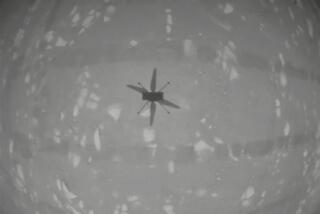Putting the Brakes on Mars Spaceship : Research: McDonnell Douglas and another company will try to figure out the best way to stop the space vehicle once it reaches the Red Planet.
- Share via
HUNTINGTON BEACH — After a 35-million-mile journey through space lasting as long as two years, a spaceship on a pioneering mission to Mars will have to do one thing once it gets there.
Hit the brakes.
That’s why McDonnell Douglas Space Systems Co. in Huntington Beach and a North Carolina research center are preparing to launch a series of tests on a concept known as “aerobrakes,” which could be used to slow down a spacecraft as it neared the Red Planet.
Normally, spacecraft use reverse rockets and burn fuel to slow their entry into Earth’s atmosphere. But the aerobrakes that will be tested by McDonnell Douglas and the Mars Mission Research Center in North Carolina will create an aeronautic drag--much like a parachute--to slow the spacecraft.
John Garvey, a manager in the advanced technology group, said that aerobrakes, which would resemble a large flat plate, are advantageous because the spaceship would not have to carry the extra fuel for the retrorockets used in slowing.
The space brake would likely be large and span 100 feet, Garvey said, and would probably have to be manufactured in space at the manned U.S. space station, which NASA hopes to launch in the late 1990s. The aerobrake must also be made of materials that can withstand extremely hot temperatures.
McDonnell Douglas plans to test the space-brake concept, specifically how it could be manufactured, at its underwater research tank in Huntington Beach, Garvey said. Pete Conrad, a former Apollo astronaut, will help conduct the experiment, which will require divers to work underwater in a zero-gravity simulation with a robotic arm.
It will be years before any space-brake prototypes are actually built, though small experimental versions could be tested on space shuttle missions in the late-1990s.
Last year, President Bush proposed sending a manned mission to Mars by 2019, but the project has not yet received any portion of the mission’s estimated $300 billion to $500 billion cost.
More to Read
Sign up for Essential California
The most important California stories and recommendations in your inbox every morning.
You may occasionally receive promotional content from the Los Angeles Times.












